| Listing 1 - 10 of 59 | << page >> |
Sort by
|
Book
ISBN: 1400846536 0691138133 0691195978 9781400846535 1299606873 9781299606876 9780691138138 Year: 2013 Publisher: Princeton, N.J. : Princeton University Press,
Abstract | Keywords | Export | Availability | Bookmark
 Loading...
Loading...Choose an application
- Reference Manager
- EndNote
- RefWorks (Direct export to RefWorks)
Ancient Greek literature, Athenian civic ideology, and modern classical scholarship have all worked together to reinforce the idea that there were three neatly defined status groups in classical Athens--citizens, slaves, and resident foreigners. But this book--the first comprehensive account of status in ancient democratic Athens--clearly lays out the evidence for a much broader and more complex spectrum of statuses, one that has important implications for understanding Greek social and cultural history. By revealing a social and legal reality otherwise masked by Athenian ideology, Deborah Kamen illuminates the complexity of Athenian social structure, uncovers tensions between democratic ideology and practice, and contributes to larger questions about the relationship between citizenship and democracy. Each chapter is devoted to one of ten distinct status groups in classical Athens (451/0-323 BCE): chattel slaves, privileged chattel slaves, conditionally freed slaves, resident foreigners (metics), privileged metics, bastards, disenfranchised citizens, naturalized citizens, female citizens, and male citizens. Examining a wide range of literary, epigraphic, and legal evidence, as well as factors not generally considered together, such as property ownership, corporal inviolability, and religious rights, the book demonstrates the important legal and social distinctions that were drawn between various groups of individuals in Athens. At the same time, it reveals that the boundaries between these groups were less fixed and more permeable than Athenians themselves acknowledged. The book concludes by trying to explain why ancient Greek literature maintains the fiction of three status groups despite a far more complex reality.
Social status --- Social standing --- Socio-economic status --- Socioeconomic status --- Standing, Social --- Status, Social --- History. --- Athens (Greece) --- Greece --- Social conditions. --- Social conditions --- Power (Social sciences) --- Prestige
Book
ISBN: 3959481837 3869459697 9783869459691 9783959481830 Year: 2016 Publisher: Nordhausen, [Germany] : Verlag Traugott Bautz GmbH,
Abstract | Keywords | Export | Availability | Bookmark
 Loading...
Loading...Choose an application
- Reference Manager
- EndNote
- RefWorks (Direct export to RefWorks)
Book
ISBN: 0511852649 1107217636 1282918729 9786612918728 0511931468 0511932804 0511927614 0511925077 0511779607 0511930127 9780511932809 9780521766913 0521766915 9780511779602 9781107637610 1107637619 9780511852640 9781107217638 9781282918726 6612918721 9780511931468 9780511927614 9780511925078 9780511930126 Year: 2011 Publisher: Cambridge Cambridge University Press
Abstract | Keywords | Export | Availability | Bookmark
 Loading...
Loading...Choose an application
- Reference Manager
- EndNote
- RefWorks (Direct export to RefWorks)
Are children of equal, lesser, or perhaps even greater moral importance than adults? This work of applied moral philosophy develops a comprehensive account of how adults as moral agents ascribe moral status to beings - ourselves and others - and on the basis of that account identifies multiple criteria for having moral status. It argues that proper application of those criteria should lead us to treat children as of greater moral importance than adults. This conclusion presents a basis for critiquing existing social practices, many of which implicitly presuppose that children occupy an inferior status, and for suggesting how government policy, law, and social life might be different if it reflected an assumption that children are actually of superior status.
Children. --- Social status --- Childhood --- Kids (Children) --- Pedology (Child study) --- Youngsters --- Age groups --- Families --- Life cycle, Human --- Social standing --- Socio-economic status --- Socioeconomic status --- Standing, Social --- Status, Social --- Power (Social sciences) --- Prestige --- Moral and ethical aspects. --- Law --- General and Others
Book
ISBN: 1501710745 1501710737 1501710753 Year: 2018 Publisher: Ithaca, NY : Cornell University Press,
Abstract | Keywords | Export | Availability | Bookmark
 Loading...
Loading...Choose an application
- Reference Manager
- EndNote
- RefWorks (Direct export to RefWorks)
Myungji Yang's From Miracle to Mirage is a critical account of the trajectory of state-sponsored middle-class formation in Korea in the second half of the twentieth century. Yang's book offers a compelling story of the reality behind the myth of middle-class formation. Capturing the emergence, reproduction, and fragmentation of the Korean middle class, From Miracle to Mirage traces the historical process through which the seemingly successful state project of building a middle-class society resulted in a mirage.Yang argues that profitable speculation in skyrocketing prices for Seoul real estate led to mobility and material comforts for the new middle class. She also shows that the fragility inherent in such developments was embedded in the very formation of that socioeconomic group.Taking exception to conventional views, Yang emphasizes the role of the state in producing patterns of class structure and social inequality. She demonstrates the speculative and exclusionary ways in which the middle class was formed. Domestic politics and state policies, she argues, have shaped the lived experiences and identities of the Korean middle class.From Miracle to Mirage gives us a new interpretation of the reality behind the myth. Yang's analysis provides evidence of how in cultural and objective terms the country's rapid, compressed program of economic development created a deeply distorted distribution of wealth.
Social status --- Middle class --- Bourgeoisie --- Commons (Social order) --- Middle classes --- Social classes --- Social standing --- Socio-economic status --- Socioeconomic status --- Standing, Social --- Status, Social --- Power (Social sciences) --- Prestige --- Social conditions --- Korea (South) --- Social conditions. --- South Korea, middle class, globalization, economic development.
Book
ISBN: 9780128092941 0128092947 9780128053713 0128053712 Year: 2018 Publisher: London, England : Academic Press,
Abstract | Keywords | Export | Availability | Bookmark
 Loading...
Loading...Choose an application
- Reference Manager
- EndNote
- RefWorks (Direct export to RefWorks)
The Handbook of Social Status Correlates summarizes findings from nearly 4000 studies on traits associated with variations in socioeconomic status. Much of the information is presented in roughly 300 tables, each one providing a visual snapshot of what research has indicated regarding how a specific human trait appears to be correlated with socioeconomic status. The social status measures utilized and the countries in which each study was conducted are also identified.--
Social status. --- Social classes. --- Class distinction --- Classes, Social --- Rank --- Caste --- Estates (Social orders) --- Social status --- Class consciousness --- Classism --- Social stratification --- Social standing --- Socio-economic status --- Socioeconomic status --- Standing, Social --- Status, Social --- Power (Social sciences) --- Prestige
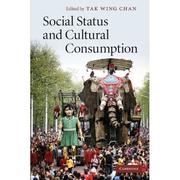
ISBN: 9780521194464 9780511712036 9781107406988 9780511712753 0511712758 0511714831 9780511714832 9780511722899 0511722893 0511712030 0521194466 9780511713583 1107406986 1107204763 9781107204768 1283331365 9781283331364 0511713584 9780511713583 9786613331366 6613331368 0511716087 9780511716089 Year: 2010 Publisher: Cambridge Cambridge University Press
Abstract | Keywords | Export | Availability | Bookmark
 Loading...
Loading...Choose an application
- Reference Manager
- EndNote
- RefWorks (Direct export to RefWorks)
Leading scholars from around the world examine the social stratification of arts and culture in contemporary society.
Social stratification --- Sociology of culture --- Consumption (Economics) --- Social status --- Social aspects --- Social status. --- Social aspects. --- Social standing --- Socio-economic status --- Socioeconomic status --- Standing, Social --- Status, Social --- Power (Social sciences) --- Prestige --- Consumer demand --- Consumer spending --- Consumerism --- Spending, Consumer --- Demand (Economic theory) --- Social Sciences --- Sociology --- Consumption (Economics) - Social aspects
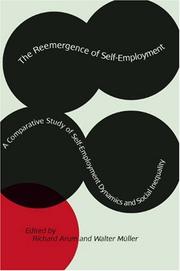
ISBN: 069111756X 0691117578 9786612158810 1282158813 140082611X 9781400826117 9780691117577 9780691117560 9780691117577 9781282158818 Year: 2004 Publisher: Princeton, N.J. : Princeton University Press,
Abstract | Keywords | Export | Availability | Bookmark
 Loading...
Loading...Choose an application
- Reference Manager
- EndNote
- RefWorks (Direct export to RefWorks)
This book presents results of a cross-national research project on self-employment in eleven advanced economies and demonstrates how and why the practice is reemerging in modern societies. While traditional forms of self-employment, such as skilled crafts work and shop keeping, are in decline, they are being replaced by self-employment in both professional and unskilled occupations. Differences in self-employment across societies depend on the extent to which labor markets are regulated and the degree to which intergenerational family relationships are a primary factor structuring social organization. For each of the eleven countries analyzed, the book highlights the extent to which social background, educational attainment, work history, family status, and gender affect the likelihood that an individual will enter--and continue--a particular type of self-employment. While involvement with self-employment is becoming more common, it is occurring for individuals in activities that are more diverse, unstable and transitory than in years past.
Self-employed. --- Equality. --- Social status. --- Travailleurs indépendants --- Egalité (Sociologie) --- Statut social --- Travailleurs indépendants --- Egalité (Sociologie) --- Social standing --- Socio-economic status --- Socioeconomic status --- Standing, Social --- Status, Social --- Egalitarianism --- Inequality --- Social equality --- Social inequality --- Free-lancers --- Freelancers --- Power (Social sciences) --- Prestige --- Political science --- Sociology --- Democracy --- Liberty --- Persons
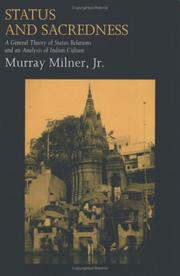
ISBN: 1280443685 1423738896 0195359127 160129946X 9781423738893 9780195359121 9781280443688 0195084896 0195083342 9780195084894 9780195083347 0197743412 Year: 2023 Publisher: Oxford : Oxford University Press,
Abstract | Keywords | Export | Availability | Bookmark
 Loading...
Loading...Choose an application
- Reference Manager
- EndNote
- RefWorks (Direct export to RefWorks)
In this provocative study, Milner argues against the widely held view that the caste system of India is unique. Instead he contends that caste distinctions which appear to be singular or exotic are actually similar to customs elsewhere-a theory that sets in sharp relief the methods by which society is organized around status relations.
Social status. --- Social structure. --- Sociology --- Religion and social status. --- Hindu sociology. --- Caste --- Brahmanism --- Ethnology --- Hinduism --- Sociology, Hindu --- Social status and religion --- Religion and sociology --- Organization, Social --- Social organization --- Anthropology --- Social institutions --- Social standing --- Socio-economic status --- Socioeconomic status --- Standing, Social --- Status, Social --- Power (Social sciences) --- Prestige --- Philosophy.
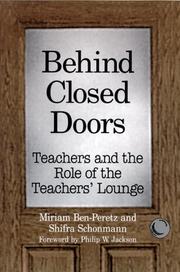
ISBN: 0791493172 0585277397 9780585277394 0791444473 0791444481 9780791444474 9780791444481 9780791493175 Year: 2000 Publisher: Albany : State University of New York Press,
Abstract | Keywords | Export | Availability | Bookmark
 Loading...
Loading...Choose an application
- Reference Manager
- EndNote
- RefWorks (Direct export to RefWorks)
Teachers' lounges --- Teachers --- #PBIB:2001.4 --- Teachers' socio-economic status --- Lounges, Teachers' --- School facilities --- In-service training --- Professional relationships --- Social conditions --- Teachers' lounges. --- Lerarenopleiding --- In-service training. --- Professional relationships. --- Social conditions. --- (vak)didactiek menswetenschappen. --- Enseignants --- Relations professionnelles. --- Conditions sociales. --- Formation en cours d'emploi.
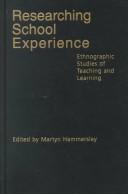
ISBN: 1135701849 0203979052 1280147156 9786610147151 9780203979051 9780750709156 0750709154 9780750709149 0750709146 9781135701840 0750709154 0750709146 9781280147159 6610147159 1135701830 Year: 1999 Publisher: London ; New York : Falmer Press,
Abstract | Keywords | Export | Availability | Bookmark
 Loading...
Loading...Choose an application
- Reference Manager
- EndNote
- RefWorks (Direct export to RefWorks)
There is a tendency in much educational thinking to view pupils in passive terms, as the material on which schools operate. This damaging view is challenged here. Significant recent research shows the effects of changing educational conditions on the experience of teaching and learning in schools. By redressing the balance and acknowledging the affective side of pupils and their learning, this book shows that improved understanding leads to improved teaching. Contributions from Stephen Ball, Martyn Descombe, Ann Filer, Andy Hargreaves, Bob Jeffrey, Geoff Troman, Andrew Pollard and Peter Woods.
Teaching --- Teachers --- Learning. --- Educational sociology. --- Ethnology. --- Cultural anthropology --- Ethnography --- Races of man --- Social anthropology --- Anthropology --- Human beings --- Education and sociology --- Social problems in education --- Society and education --- Sociology, Educational --- Sociology --- Education --- Learning process --- Comprehension --- Teachers' socio-economic status --- Social aspects. --- Social conditions. --- Aims and objectives --- #PBIB:2000.1
| Listing 1 - 10 of 59 | << page >> |
Sort by
|

 Search
Search Feedback
Feedback About UniCat
About UniCat  Help
Help News
News